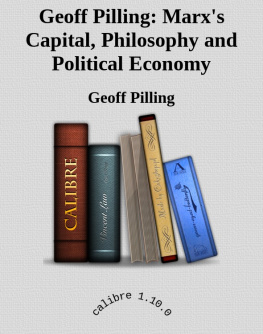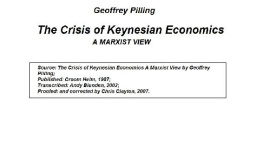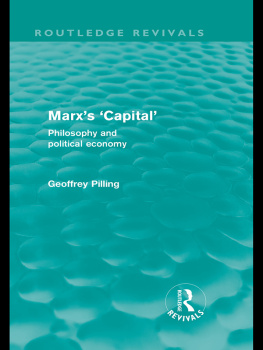Geoff Pilling - Geoff Pilling: Marxs Capital, Philosophy and Political Economy
Here you can read online Geoff Pilling - Geoff Pilling: Marxs Capital, Philosophy and Political Economy full text of the book (entire story) in english for free. Download pdf and epub, get meaning, cover and reviews about this ebook. publisher: Marxists Internet Archive, genre: Religion. Description of the work, (preface) as well as reviews are available. Best literature library LitArk.com created for fans of good reading and offers a wide selection of genres:
Romance novel
Science fiction
Adventure
Detective
Science
History
Home and family
Prose
Art
Politics
Computer
Non-fiction
Religion
Business
Children
Humor
Choose a favorite category and find really read worthwhile books. Enjoy immersion in the world of imagination, feel the emotions of the characters or learn something new for yourself, make an fascinating discovery.
- Book:Geoff Pilling: Marxs Capital, Philosophy and Political Economy
- Author:
- Publisher:Marxists Internet Archive
- Genre:
- Rating:5 / 5
- Favourites:Add to favourites
- Your mark:
- 100
- 1
- 2
- 3
- 4
- 5
Geoff Pilling: Marxs Capital, Philosophy and Political Economy: summary, description and annotation
We offer to read an annotation, description, summary or preface (depends on what the author of the book "Geoff Pilling: Marxs Capital, Philosophy and Political Economy" wrote himself). If you haven't found the necessary information about the book — write in the comments, we will try to find it.
Geoff Pilling: author's other books
Who wrote Geoff Pilling: Marxs Capital, Philosophy and Political Economy? Find out the surname, the name of the author of the book and a list of all author's works by series.
Geoff Pilling: Marxs Capital, Philosophy and Political Economy — read online for free the complete book (whole text) full work
Below is the text of the book, divided by pages. System saving the place of the last page read, allows you to conveniently read the book "Geoff Pilling: Marxs Capital, Philosophy and Political Economy" online for free, without having to search again every time where you left off. Put a bookmark, and you can go to the page where you finished reading at any time.
Font size:
Interval:
Bookmark:
Table of Contents
1.
2.
After more than thirty post-war years, during which time most commentators believed that the outstanding questions in economic theory had been resolved, considerable doubt once again pervades the subject. In the opinion of increasing numbers, economics has singularly failed to find any coherent answers to the mounting problems facing capitalist economy throughout the world. Our purpose is not to examine this crisis in conventional economic theory, but we can certainly note the growing scepticism about the ability of Keynesianism to provide the basis for a viable economic policy in the capitalist world. After years during which it was complacently taken as read that Keynes had answered Marx many now see in Keynesian deficit financing the source of the inflationary pressures currently threatening the stability of the western monetary system. Apart from this question of Keynesianism, of equal significance has been the attack launched against several of the principal tenets of neo-classical theory. It has been argued, for instance, that attempts to relate the return to capital to its contribution are based upon circular reasoning, since it is impossible to conceive this return independently of the rate of profit. Other serious blows have also been struck at the marginal productivity theory of distribution in so far as it has been demonstrated that no unique relationship holds between the degree of capital intensity and the distribution of income. One effect of this work (for a selection see Hunt and Schwartz, 1972) has been seriously to undermine one traditional neo-classical justification for the existing pattern of income distribution by reference to technology.
This new crisis in economic theory, stimulating as it has a return to the preoccupations of nineteenth-century political economy, has led to a revived interest in Marxian economics. This new interest has in part been reflected in the emergence of bodies such as the Conference of Socialist Economists. It is within such bodies that several aspects of Marxist political economy have been debated. But it must be acknowledged at the outset that little, if anything, has been settled in the course of these debates. The arguments have been heated, acrimonious, often abusive, but quite inconclusive. (Fine and Harris, 1976, provide a useful survey of some of these debates.) The fact that these controversies have often ended with a mere reassertion of previously-held positions is no doubt a reflection of political and ideological differences which can only be resolved in practice. But another important aspect of many of these disputes has been the relative neglect of the fundamental questions of Marxist method. Thus discussion has been interminable about the nature of Marxs value theory and its true relationship to the more concrete categories such as prices, wages, rate of profit, etc. Yet in most cases these aspects of Marxs work have been considered apart from Capital as a whole. Marxs work cannot be reduced to a series of results, to be tested against the facts of capitalist development. What is involved here is nothing less than the struggle between the Marxist method and the method of empiricism. It was this empiricism which Marx had to overcome in his critique of political economy. And it is this same empiricist tradition which has dominated much Marxism in Britain. Until this tradition is faced up to and overcome, then the disputes in Marxian economics will remain unresolved.
As an instance of the impact of empirical methods of thought on these questions of political economy, let us take the example of the post-war boom. It was, of course, during this boom that Keynesianism came to prominence in the field of economic policy. But it must be recognized that this same Keynesianism also left its imprint upon Marxism. Many writers on Capital concluded that capitalism had indeed entered a new phase in its history. Special terms were coined to designate this new phase neo-capitalism and permanent arms economy being amongst the most prominent. And from such notions definite political conclusions were drawn by some that the major struggles in the world had passed from the metropolitan capitalist centres and had found a new epicentre in the colonial and semi-colonial world. Others concluded that in this new phase the working class no longer constituted a revolutionary force the responsibility for carrying forward the revolution now fell to the students and other layers increasingly alienated by capitalism (Marcuses view was prominent in this area).
Now nobody would seek to deny that capitalism did indeed experience a significant period of extended reproduction after 1945. Indeed, far from denying this phenomenon, the task of Marxism is to explain its significance. But it Is here that we run up directly against the problem of empiricism in its conflict with the method of Marxism. For if we wish to form an adequate conception of this period we must get to the essence of this boom, to its real contradictory nature. And this we cannot do simply by reading off a series of surface phenomena (indices of production, of living standards, etc). In the historical development of capitalism there have been booms and there have been booms. There was the long secular boom from 1850 onwards, and there was the boom which preceded (and in several respects precipitated) the 1929 Wall Street Crash. As Lenin insisted, Marxism demands a concrete analysis of a concrete situation. The period of relative expansion after 1945 cannot be taken as a thing-in-itself, to be judged against some abstract criteria. This has always been the essential feature of those works seeking to revise Marx. A series of empirical data is advanced as evidence that Marx was either wrong or in need of updating. As against this method a real analysis of the post-war expansion has to be posited on to the whole line of capitalist development. For Marxism, the twentieth century represents the epoch not of capitalism as such, but of imperialism, the highest stage of capitalist development, the epoch when the productive forces find themselves in a historically irreconcilable conflict with the existing property relations. It is against this background that the nature of the post-war boom must be evaluated and it is not without significance to note in this connection that many who saw in the post-war boom period an entirely new phase of capitalist development also sought to reject Lenins notion of imperialism. To deal with any phenomenon concretely means to treat all aspects of the phenomenon concerned in their origin and development. Specifically, in connection with the post-war period, it must be stressed that capitalism emerged after 1945 considerably weakened, weakened by a loss of territory in eastern Europe and China and having to face a working class which was quite different from the class defeated in the struggles of the 1930s. It is this weakness which must be the starting point for any investigation of post-war economy, a weakness which was relatively hidden by the movement of those indices to which conventional economic theory confines its attention. It was out of weakness that capitalism was obliged to abandon the old gold standard and revert to a Keynesianism which in practice involved a controlled expansion of money and credit. One is reminded of what Trotsky said in this connection:
During the nineteenth century, gold as a universal means of value became the foundation of all monetary systems worthy of the name. Departures from the gold standard tear world economy apart even more successfully than do tariff walls. Inflation, itself an expression of disordered economic ties between nations, intensifies the disorder and helps to turn it from a functional into an organic one. (Trotsky, 1978)
Next pageFont size:
Interval:
Bookmark:
Similar books «Geoff Pilling: Marxs Capital, Philosophy and Political Economy»
Look at similar books to Geoff Pilling: Marxs Capital, Philosophy and Political Economy. We have selected literature similar in name and meaning in the hope of providing readers with more options to find new, interesting, not yet read works.
Discussion, reviews of the book Geoff Pilling: Marxs Capital, Philosophy and Political Economy and just readers' own opinions. Leave your comments, write what you think about the work, its meaning or the main characters. Specify what exactly you liked and what you didn't like, and why you think so.













